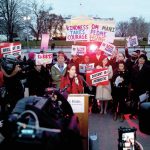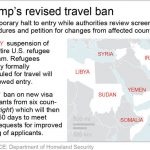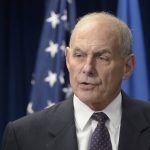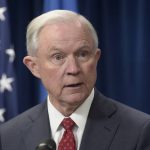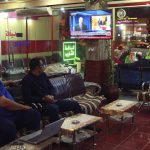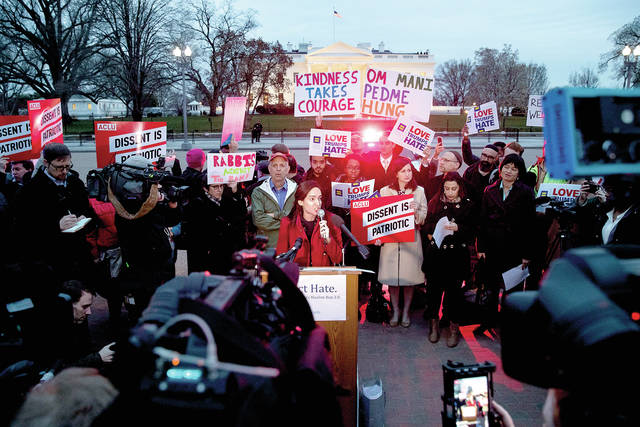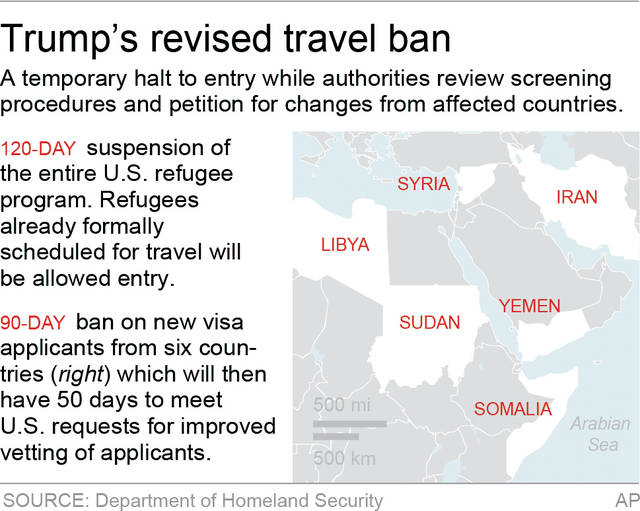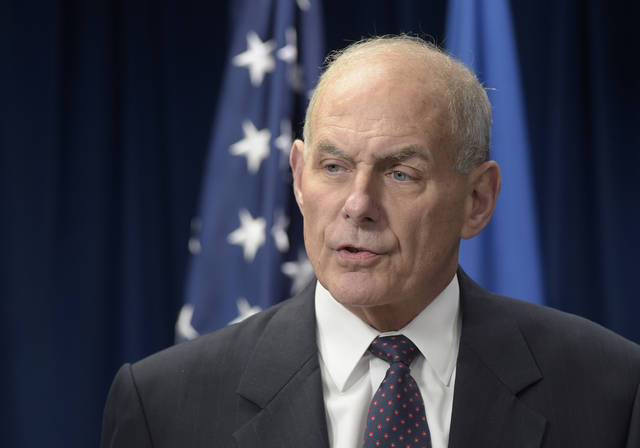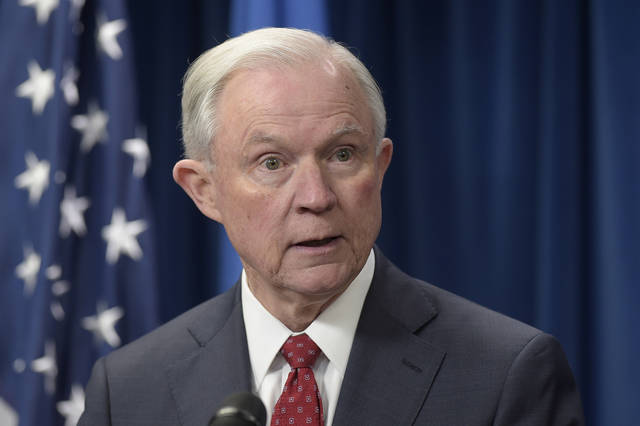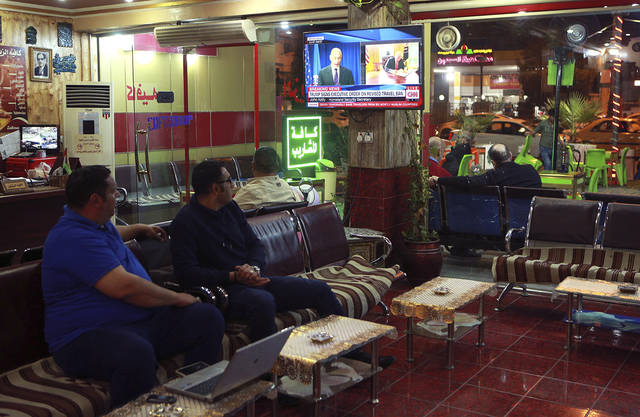KAILUA-KONA — President Donald Trump took a second crack at instituting a travel ban Monday, signing an executive order suspending new visas for citizens of six foreign countries for 90 days while halting the flow of all refugees into the United States for 120 days.
The revised version of the president’s original travel ban — which was issued Jan. 27 and was challenged in court, stayed by a federal judge and ultimately rescinded Monday — has a few key differences.
Iraq no longer is among the list of the majority-Muslim countries targeted by the ban. The revised order includes Iran, Libya, Somalia, Sudan, Syria and Yemen. Syrian refugees, who would have been denied entry into the U.S. indefinitely under the first order, now are subject to the same 120-day hold as refugees from every other country.
Refugees who qualify as religious minorities, namely Christians, will not receive preferential immigration status. Also, the ban will not apply to existing visa holders, as its predecessor did.
The executive order is scheduled to take effect March 16, affording various government agencies involved time to prepare in an effort to avoid the chaos that accompanied the initial travel ban’s rollout.
Critics of Trump’s action say despite the material changes from the first ban to the next, the essence and intent remain the same.
“To the ACLU, the changes to the ban, while cosmetic, do not change the core, which is still an attack on one specific religion,” said Mateo Caballero, legal director of the American Civil Liberties Union of Hawaii. “This is still a Muslim ban. It continues to target these countries (and their people) based on their religion, which is just unconstitutional.”
Several Hawaii politicians who spoke out vigorously against the first order stuck by their initial statements Monday, agreeing with Caballero that Trump was simply more considered this time around as he attempts to dress up the revised ban as a matter of national security in an effort to mask the blatant religious persecution they say it is.
“This administration continues to use immigrants and refugees — those fleeing from violence — as scapegoats for global terrorism,” Sen. Brian Schatz said in a statement. “This ‘updated’ Muslim ban is still a Muslim ban. It may be more carefully constructed, but it is still racist and counterproductive. It’s a violation of American values that only damages our national security.”
Sen. Mazie Hirono and Rep. Tulsi Gabbard also voiced opposition to Trump’s executive order in statements released Monday.
Department of Homeland Security Secretary John F. Kelly stood up for the revised travel ban, calling it “prospective” and stressing its importance as a measure to keep Americans safe from terrorist threats abroad.
“Unregulated, unvetted travel is not a universal privilege, especially when national security is at stake,” he said.
Attorney General Jeff Sessions echoed Kelly’s comments, mentioning 300 refugees who found their way into the U.S. and now are being investigated by the FBI for connections to cases of terrorism. He declined to elaborate any further.
Caballero countered, saying to brand the travel ban as a national security initiative is a strained and inconsistent characterization. He cited rhetoric employed during the campaign for the presidency, in which Trump specifically spoke about banning Muslims from entering the United States as a security measure.
If national security is the primary objective of the order, Caballero posed the questions of why Iraq was able to “lobby” its way off the list of banned nations, as well as why Trump waited a week to announce and sign the ban after the final draft was completed.
The New York Times reported Monday that Iraq’s absence from the list was the result of advice from officials with the departments of State and Defense who were concerned including Iraq would “undermine the stability of the United States-allied government.”
Caballero also referenced a recent report by the Associated Press in which Homeland Security assessed a person’s country of citizenship is an “unlikely indicator” of his or her propensity for terrorism.
“If you connect the dots, it’s very hard to see how this is justified by national security,” Caballero said. “The only explanation for it is to target Muslims and to essentially sew division.”
Any attempt to single out or persecute a group of people based on their religion will never stand up in court, Caballero added, saying the administration’s legal strategy to avoid challenges to the executive order in federal court is evident in the revised language of the amended version.
That strategy begins with the exclusion of visa holders as targets of the immigration ban.
“The strategy is to make it difficult to find plaintiffs,” Caballero explained. “By defining the ban in such a way that it only affects people abroad who do not have visas or another way to come to the U.S., it makes it significantly harder to challenge the ban because you can’t find those plaintiffs with standing to sue in a United States District Court.”
He added that while the administration clearly is being more careful in its crafting and implementation of the revised order, he expects it again will be challenged and ultimately struck down as unconstitutional by the court system.
“That strategy will not work because the 9th Circuit held it wasn’t just the folks with visas affected, but their family members. Other people in process of getting visas will also be affected,” Caballero said. “Their family members here will have standing and will be able to sue on behalf of their loved ones abroad.”
States including Washington, which sued Trump after he enacted the initial travel ban, also will retain standing, Caballero said.
Hawaii Attorney General Doug Chin issued a statement Monday speaking out against the ban, adding that his office “is reviewing the new order and will decide what next steps may be necessary.”
The ACLU of Hawaii and immigration lawyers fielded a host of concerned calls amid the chaos of the first executive order. While the organization was told by Customs and Border Protection that no one was ever detained at either of Hawaii’s international airports in Honolulu and Kailua-Kona, the ACLU has been unable to verify that statement.
Caballero said the ACLU sent a Freedom of Information Act request to Customs and Border Protection three weeks ago to confirm its claims, and he expects to hear back within a month.
Most of the calls fielded by the ACLU during the past several weeks were from concerned Hawaii residents whose family members, many of them valid visa holders, were stranded abroad. The stay of Trump’s first executive order by a federal court allowed those people in question to board planes and return to the state.
Still, Caballero said the travel ban reverberated throughout Hawaii and the rest of the country in the form of increased backlash at minorities and immigrants, and that its residual effects continue to persist.
“We have seen an increase in reports about hate crimes. These are hate crimes against not only our Muslim neighbors, but also Jewish schools and even just immigrants in general — folks that just look different or speak a different language,” said Caballero, speaking generally about the country. “My understanding is that there has been an uptick, and even in Hawaii we have seen increased reports of hate crimes targeting minorities.”
The concern is high enough, Caballero said, to spur a joint press conference between Oahu Mayor Kirk Caldwell and the Hawaiian Muslim Association, which is scheduled for noon today at a mosque in Honolulu.
There, Caldwell will address the need for unity between members of different races, religions and countries of origin living together in Hawaii.
Email Max Dible at mdible@westhawaiitoday.com.
